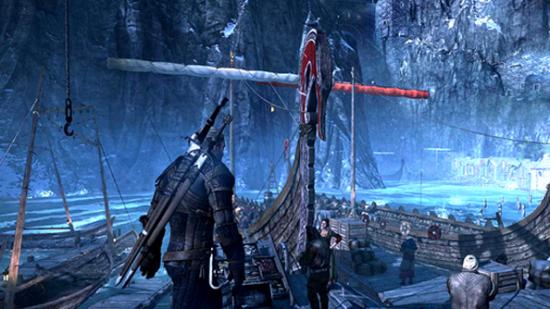I’ve spent the last week umming and harumphing in the direction of The Witcher 3: Wild Hunt, and more pertinently its roots in CD Projekt’s proprietary REDengine 3 – the tech which allows for its seamlessly open world. Yes, it’s an upgrade of sorts, and yes, the open world RPG is a genuinely wonderful form – but I’m left, metaphorically speaking, staring at the new pelican crossing and coming to the slow realisation that I sort of fancied the lollipop lady.
In short, I’m struggling to imagine how the chapter-based, controlled sprawl of the series thus far will be carried to its new form without snapping its branching pathways beyond repair. Thankfully game director Konrad Tomaszkiewicz and lead quest designer / sibling Mateusz are on hand to allay a few fears, to talk Skyrim’s failings and to agonise over the proper implementation of horses.
The Tomaszkiewiczs believe that The Witcher 2’s “only” real shortcoming was a lack of “freedom of exploration” – as evidenced by Geralt’s horse, a mainstay of the Witcher books.
“I remember talks during the production of The Witcher 2 about ‘Why not implement a horse?’,” said Mateusz in a Game Informer interview. “But the landscapes were not big enough to really experience the horse. We thought for the next game it would be very cool to have those mechanisms.”
Creating an open world has presented an abundance of new design challenges – not least the need to build emergent systems to populate it while keeping the series’ reputation for choice and consequence alive. In that, the CD Projekt RED team aim to outdo Skyrim.
“We are players also and we love open world games,” said Konrad. “I think the lesson that we learned on Skyrim is that you need to care about the immersion of the game, all the time. You can’t show that you got some generic solutions or generic stuff in the game and Skyrim — it was generic.
“You could make the same quest a few times, and every time, an NPC didn’t spot that you [completed it] for him previously. In my opinion to make the simulation, every quest needs to be designed [so] that the NPC reacts to what you’re doing.”
“This immersion is better in The Witcher 2 because every choice has its own consequences. You see how you change the lives of the people, and you can speak with them about it. Sometimes they are angry with you and sometimes they are happy with what you are doing, but you see that they live and they can be real.”
Skyrim’s other key failing was in its characters, said Konrad, or lack thereof: “I tried to remember five characters from Skyrim and name them from memory, and I can’t,” he said.
“[But] for sure we need to learn from them, how to make this feeling of open world, how to build the world with these huge vistas but at the same time fill it with ambience, adventures and stuff you can do. I think that when we combine it with our knowledge from the previous games it will be a perfect RPG.”
Maybe so. Any pointers on how CD Projekt might go about concocting that perfect combination? Infinite manpower / Tomaszkiewicz cloning are not the sort of answers a CFO would plump for, so let’s rule them out straight away.
